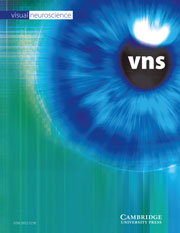Crossref Citations
This article has been cited by the following publications. This list is generated based on data provided by
Crossref.
Bloomfield, Stewart A.
and
Xin, Daiyan
2000.
Surround inhibition of mammalian AII amacrine cells is generated in the proximal retina.
The Journal of Physiology,
Vol. 523,
Issue. 3,
p.
771.
Dacey, Dennis
Packer, Orin S.
Diller, Lisa
Brainard, David
Peterson, Beth
and
Lee, Barry
2000.
Center surround receptive field structure of cone bipolar cells in primate retina.
Vision Research,
Vol. 40,
Issue. 14,
p.
1801.
Watanabe, Shu-Ichi
Satoh, Hiromasa
Koizumi, Amane
Takayanagi, Tohru
and
Kaneko, Akimichi
2000.
Tetrodotoxin-sensitive persistent current boosts the depolarization of retinal amacrine cells in goldfish.
Neuroscience Letters,
Vol. 278,
Issue. 1-2,
p.
97.
Masland, Richard H.
and
Raviola, Elio
2000.
Confronting Complexity: Strategies for Understanding the Microcircuitry of the Retina.
Annual Review of Neuroscience,
Vol. 23,
Issue. 1,
p.
249.
Berntson, Amy
and
Taylor, W. Rowland
2000.
Response characteristics and receptive field widths of on‐bipolar cells in the mouse retina.
The Journal of Physiology,
Vol. 524,
Issue. 3,
p.
879.
Koizumi, Amane
Watanabe, Shu-Ichi
and
Kaneko, Akimichi
2001.
Persistent Na+ Current and Ca2+ Current Boost Graded Depolarization of Rat Retinal Amacrine Cells in Culture.
Journal of Neurophysiology,
Vol. 86,
Issue. 2,
p.
1006.
Flores-Herr, Nicolas
Protti, Dario A.
and
Wässle, Heinz
2001.
Synaptic Currents Generating the Inhibitory Surround of Ganglion Cells in the Mammalian Retina.
The Journal of Neuroscience,
Vol. 21,
Issue. 13,
p.
4852.
Bloomfield, Stewart A.
and
Dacheux, Ramon F.
2001.
Rod Vision: Pathways and Processing in the Mammalian Retina.
Progress in Retinal and Eye Research,
Vol. 20,
Issue. 3,
p.
351.
Cohen, Ethan D.
2001.
Concepts and Challenges in Retinal Biology (Progress in Brain Research).
Vol. 131,
Issue. ,
p.
215.
Brown, Solange P.
and
Masland, Richard H.
2001.
Spatial scale and cellular substrate of contrast adaptation by retinal ganglion cells.
Nature Neuroscience,
Vol. 4,
Issue. 1,
p.
44.
Bloomfield, Stewart A.
2001.
Concepts and Challenges in Retinal Biology (Progress in Brain Research).
Vol. 131,
Issue. ,
p.
185.
Völgyi, Béla
Xin, Daiyan
and
Bloomfield, Stewart A.
2002.
Feedback inhibition in the inner plexiform layer underlies the surround‐mediated responses of AII amacrine cells in the mammalian retina.
The Journal of Physiology,
Vol. 539,
Issue. 2,
p.
603.
Yamada, Yoshitake
Koizumi, Amane
Iwasaki, Eisuke
Watanabe, Shu-Ichi
and
Kaneko, Akimichi
2002.
Propagation of Action Potentials From the Soma to Individual Dendrite of Cultured Rat Amacrine Cells Is Regulated by Local GABA Input.
Journal of Neurophysiology,
Vol. 87,
Issue. 6,
p.
2858.
Verweij, Jan
Hornstein, Eric P.
and
Schnapf, Julie L.
2003.
Surround Antagonism in Macaque Cone Photoreceptors.
The Journal of Neuroscience,
Vol. 23,
Issue. 32,
p.
10249.
Watanabe, Shu-Ichi
Koizumi, Amane
Yamada, Yoshitake
and
Kaneko, Akimichi
2003.
The Neural Basis of Early Vision.
p.
55.
Roska, Botond
and
Werblin, Frank
2003.
Rapid global shifts in natural scenes block spiking in specific ganglion cell types.
Nature Neuroscience,
Vol. 6,
Issue. 6,
p.
600.
Shields, Colleen R.
and
Lukasiewicz, Peter D.
2003.
Spike-Dependent GABA Inputs to Bipolar Cell Axon Terminals Contribute to Lateral Inhibition of Retinal Ganglion Cells.
Journal of Neurophysiology,
Vol. 89,
Issue. 5,
p.
2449.
Diller, Lisa
Packer, Orin S.
Verweij, Jan
McMahon, Matthew J.
Williams, David R.
and
Dacey, Dennis M.
2004.
L and M Cone Contributions to the Midget and Parasol Ganglion Cell Receptive Fields of Macaque Monkey Retina.
The Journal of Neuroscience,
Vol. 24,
Issue. 5,
p.
1079.
Sinclair, John R.
Jacobs, Adam L.
and
Nirenberg, Sheila
2004.
Selective Ablation of a Class of Amacrine Cells Alters Spatial Processing in the Retina.
The Journal of Neuroscience,
Vol. 24,
Issue. 6,
p.
1459.
McMahon, Matthew J.
Packer, Orin S.
and
Dacey, Dennis M.
2004.
The Classical Receptive Field Surround of Primate Parasol Ganglion Cells Is Mediated Primarily by a Non-GABAergic Pathway.
The Journal of Neuroscience,
Vol. 24,
Issue. 15,
p.
3736.


